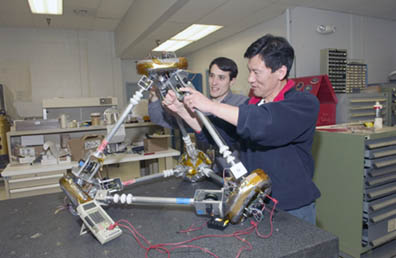National Science Foundation seeks to put innovators back in charge of startups

The National Science Foundation (NSF) has just announced a new effort to help develop scientific and engineering discoveries into useful technologies, products and processes. Some observers say that the program will finally put engineers and inventors -- not venture capitalists -- back in the driver's seat of startups.

The NSF Innovation Corps (I-Corps) program will solicit volunteers consisting of technology developers, business leaders, venture capitalists, and others from private industry to mentor new ideas coming out of universities, labs, and other small ventures. To accomplish this, NSF will fund 100 science and engineering research projects every year with awards of $50,000. They will also be able to enroll in classes that teaches scientists and engineers how to apply their well-honed skills -- hypotheses testing and experimentation -- to business startup scenarios.
With the awards, the I-Corps initiative will help identify nascent concepts -- and potentially commercialize them -- through public-private partnerships. Participating experts will share their knowledge and experience with NSF and I-Corps awardees, and serve as a mentoring network that will help transform scientific and engineering innovations into potentially successful technologies.
Silicon Valley veteran Steve Blank hails the new program as a move that finally puts engineers, scientists and other creators back in the catbird seat of startups -- a role they've been kept away from for too long. As he puts it:
"This is a big deal. Not just for scientists and engineers, not just for every science university in the U.S., but in the way we think about bringing discoveries ripe for innovation out of the university lab. If this program works it will change how we connect basic research to the business world. And it will lead to more startups and job creation."
How so? The I-Corps programs "is changing the startup landscape for scientists and engineers," Blank points out. "A first reaction to the NSF I-Corps program might be, 'You mean we haven’t already been doing this?' But the conventional wisdom has been to attempt to teach business to scientists and engineers. "But it’s only now that we realize that’s wrong," he continues. "The insight the NSF had is that we just need to teach scientists and engineers to treat business models as another research project that can be solved with learning, discovery and experimentation."
Over a period of six months, each I-Corps team, composed of the principal investigator, a mentor, and an entrepreneurial lead, will systematically identify and address knowledge gaps to ascertain the technology disposition: What resources will be required? What are the competing technologies? What value will this innovation add?
The I-Corps program will also pilot innovative merit review processes through which promising discoveries emerging from NSF-funded research projects will be identified quickly and efficiently for financial support as well as for mentorship through the national network.
This post was originally published on Smartplanet.com